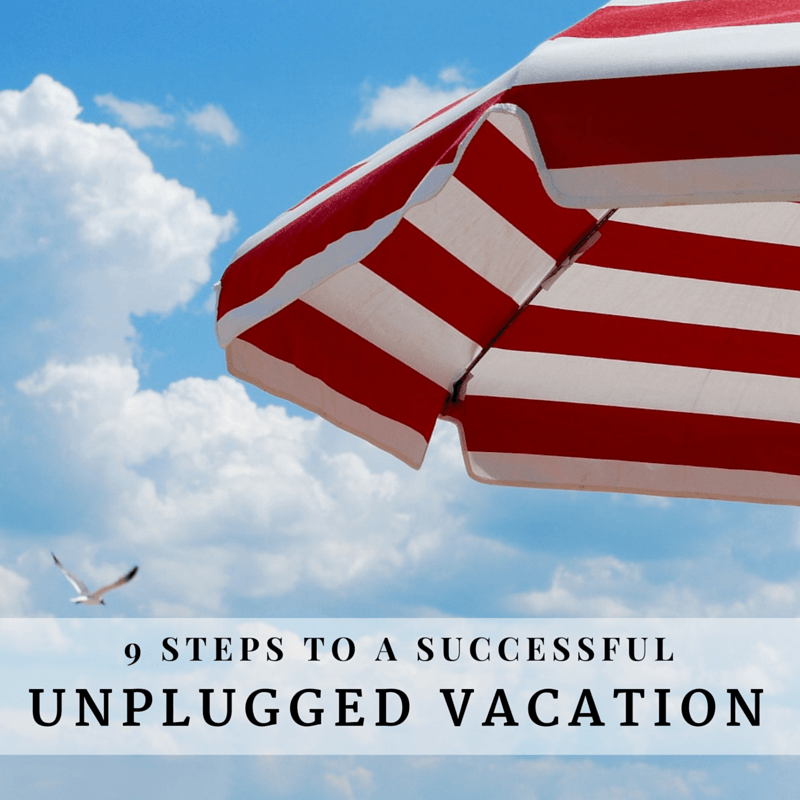
With technology making us available to work, family and friends 24×7, it’s no wonder most of us don’t unplug completely when we go on vacation.
Smartphones make it easy to stay connected, so what’s the harm? Plenty, if we never give ourselves the opportunity to replenish our energy for the never-ending stream of projects, problems and potholes we regularly manage.
I recently completed a two-week vacation, with the intention of being “unplugged.” I didn’t turn off my smartphone, so I was theoretically available. However, I ended up spending almost no time on email and had a very short transition back into the office. “How is this possible???” you might ask.
My “unplugged” process has evolved over the years. Some of these may seem like no-brainers. However, it’s only when all of them are done that I’ve found I can go away for a while, stay off-line and come back to something less than pure chaos.
1. Set clear expectations regarding your availability.
If you are going to unplug, say so and follow through. Make sure your key constituents know when you are going and when you’ll return. Believe me, they will make sure to get what they need from you in the 5 minutes before you get out the door.
2. Be specific in your out of office.
Your email and phone out of office message should indicate your lack of availability and who to contact in your absence. Caveats like “limited” access to email and phone means they will try. “No access” means no access and the clarity is usually respected.
3. Meet with key constituents before you go.
Understand what needs to be accomplished while you’re away and communicate expectations to your team. Make clear what constitutes an emergency and when and why you should be contacted. Let them know you trust them to make necessary decisions and get things done while you’re gone.
4. Make a list of anything that requires follow-up upon your return.
You will have vacation brain when you get back. If you go for two weeks, you won’t remember those last meetings before you left. Write down what you care about and leave it in a convenient spot for when you return. Do not bring it with you.
5. Do what you say and say what you do.
Do you tell your team to unplug when they are on vacation? That everyone will get along fine while they are gone? Then DO NOT respond to emails. It tells your team that you are more important than they are or that you don’t trust them. In addition, as soon as you respond to the first one, you have indicated that you really are available and they’ll keep coming.
6. Unless it’s life and death, keep out of it.
What’s the harm of letting the team handle issues that come up? Even if they wouldn’t do something the exact same way you would? How else will they learn to eventually fill your job? Vacation can be great succession training. Which leads to…
7. Do not second guess what happens when you aren’t there.
I once had a manager make a call on a personnel matter while I was away. When I returned, he asked what I would have done, worried I would have made a different choice. I said it didn’t matter, I wasn’t there and he made the call.
Backing up his decision went a long way to making him more confident in situations where I was available, but not necessary for the decision-making process. Ultimately, this helped prepare him for further responsibilities.
8. When you return, get a debrief from your team.
Whether it’s face-to-face or a return-to-work email, ask what happened that you need to know about or what’s still outstanding from while you were away. You’ll be surprised how little there may be to report.
The limited information doesn’t mean there weren’t things that happened, just that the team handled them. Also, it doesn’t mean you aren’t valuable, just that you don’t have to be around every second of every day for the team to be successful. Which is why the final advice is…
9. Get over yourself.
None of us is irreplaceable. It is the unique value we each bring that can’t be replaced. However, the work that needs doing will always figure out a way to get done. If no one can accomplish anything without you there, then the organization is setup for failure.
So, put your need to know in check and take that vacation. See how much your team can do and let them do it. Maybe there are areas where you could spend less of your time because they can clearly manage on their own. Taking time away might just give you and your team a fresh perspective on what’s possible.
Upon my return from vacation, I pulled my team together and thanked them for the “media blackout” they instituted. They honored my request to remain unplugged and took me off all email distributions. A lot happened during that time, but they handled it. I got the cliff’s notes version upon my return, and that was enough.
Do I feel like I’m not needed because things didn’t fall apart when I was gone? Not for a second. I feel like I did my job. I cleared the road ahead sufficiently for them to move forward without me around to direct traffic. Now that I’m back? It’s back to clearing the road with a fresh perspective, a clear head and no major accidents or traffic jams in my wake.
Have you successfully unplugged on vacation? What tips do you recommend for successfully leaving work behind? I’d love for you to share your experiences in the comments and keep the conversation going.








